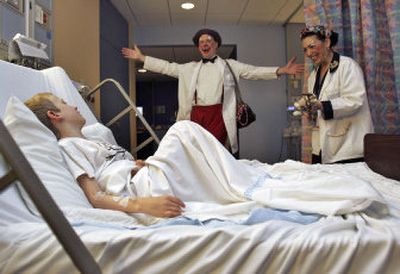‘Docs’ elicit kids’ smiles

NEW YORK – Stephen Ringold is a clown facing a tough audience – a sick child in a hospital room who needs holiday cheer.
For a few minutes, Stephany Nieto sits on her mother’s lap, suspiciously eyeing the tall man with the red-and-white checkered shoes half-hiding behind the curtain. Smiling doesn’t come easily to the little girl, who her mother says is being examined for a serious illness called moyamoya, a rare inflammation of the brain arteries that can cause seizures and paralysis.
But for a few moments, something whimsical captures her attention.
As Ringold – a.k.a. Dr. Meatloaf – stoops to pick up something, his ukulele-playing partner played by Phyllis Capello plants a hard slap on his behind with her instrument. Suddenly, Stephany is giggling.
“We put nature back into a very controlled, unnatural environment. We bring breath,” Capello said later.
Ringold is part of a program run by the Big Apple Circus called Clown Care – the first residential professional clowning program in a hospital. On this December morning at New York-Presbyterian Hospital, as the world outside gears up to celebrate Christmas, Hanukkah and Kwanzaa, children who can’t leave get a needed boost.
“We take the kids from diagnosis to whatever fate they have,” said Ringold, who is also an actor. “We go through worlds together. Sometimes I break down crying – because there’s nothing I can do, really.”
Medical clowning started more than 20 years ago at New York-Presbyterian, the brainchild of Big Apple Circus co-founder Michael Christensen. Clown “doctors” have since sprung up around the globe, from Argentina and Australia to South Africa and Turkey.
In the United States, Clown Care has 84 professionals who have passed auditions for the paid jobs. In addition to New York, they work at hospitals in Atlanta; Baltimore; Boston; Chicago; New Haven, Conn.; Providence, R.I., and Washington.
The clowns at Morgan Stanley Children’s Hospital, part of New York-Presbyterian, perform three days a week, year round. Their holiday lineup includes a Hanukkah party Dec. 18, a Christmas feast two days later, and Kwanzaa on Dec. 27.
“The holidays are an especially difficult time of the year for the children, because they’re used to being at home with family,” said Joan Bompane, the hospital’s child life director. “Bringing in the clowns helps normalize the hospital experience. It makes the children feel they’re not forgotten.”
Clowning can combat stress, reduce pain and relax muscles while boosting the natural immune system.
“Our observation is that, before surgery, the kids who went to sleep with the clowns and at least one parent had a shorter recovery period after anesthesia. They woke up faster and there were fewer, if any, minor complications,” said Dr. John Driscoll, pediatrician-in-chief at Morgan Stanley and professor of pediatrics at Columbia University Medical School.
“Their impact is direct, honest and above all, life-affirming,” said Christensen, who trained clowns who have started programs in Austria, Brazil, France and Germany.
After performing for Stephany, Ringold and Capello moved to another room – followed by grinning Stephany – to cheer up 7-year-old Conor Moran, lying pale and quiet in his bed.
Conor was hospitalized because of a rare neurological disease called Guillain-Barre Syndrome, which can suddenly stop him from breathing. But the clown act brought a smile, five minutes of fun. He even whistled along with the show.
“There’s no way you can tell what’s going to happen when you enter a room,” Ringold said.